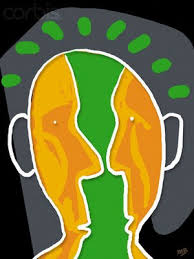Internal conflicts of a feminist, family member and person; has-been academic, psychologist and counsellor; reinvented as blogger for social justice
November 1st, 2014 | Published in Gender; Sexuality
With a title like that, who needs an excerpt?
My reinvention as a blogger for social justice began as a by-product of self-publishing a novel in November 2012. It was the most liberating feeling – to write what I think,  responsible only to myself – although not without its own tensions.
responsible only to myself – although not without its own tensions.
I will return to the blogging aspect, but first a ramble through pre-existing conflicts (for me) of life as a feminist academic, psychologist, counsellor, family member and person.
Feminist – Academic
People sometimes imagine academia as other-worldly and elitist, but it’s actually hierarchical, competitive, and elitist. In many ways Tony Abbott, our current Australian Prime Minister, would do well as an academic – which might help illustrate the problem.
People also claim you get to the top to change the system, but this can be a rationalisation. The choice is to be in or out of a hierarchy, and to be in means to participate.
Hierarchies are uncomfortable for feminists who see oppression as a function of top-down power, and there are other problems too. For example, any work you might do to shape a constructive learning environment will not be formally recognised, and while some people (usually women) are doing this work, others are writing papers, applying for grants, and sitting on committees.
The hierarchy of academia thus becomes a gendered hierarchy and is also, of course, most welcoming if you are white, heterosexual, and able-bodied.
Feminist – Psychologist
Feminism in academia becomes even trickier when the discipline is psychology. Mainstream psychology is based on ideas about human beings that are reductionist, decontextualised, and assumed to be politically neutral. The effect is to locate problems, and solutions, within individuals (and hence to ‘blame the victim’).
Feminist analyses, on the other hand, reframe many experiences of personal distress as a function of social relations of power, and so psychology, to be feminist psychology, would need to understand the person in social context.
There is hope. The student award developed in association with this website, for example, is located in a combined psychology-social work degree, and I’m expecting to witness, and promote, bridge-building as part of my involvement.
Feminist – Counsellor
Counselling can likewise lean towards personalising issues rather than politicising them. Some feminists argue there can be no such thing as feminist counselling, although I think it is possible to respond to personal pain in ways that don’t blame the victim and do this in parallel with working towards social change.
The distress of asylum seekers in Australia, for example, needs to be addressed in tandem with challenging the punitive policies that create the distress. Individuals may need immediate survival skills, as well as validation, support and witnessing, but long term survival is about visas, and visas require just policies.
Feminist – Family Member
As a feminist and family member, the tension I would like to highlight is between guilt (maternal, spousal) and resistance to the image of yielding, serving, passive womanhood.
womanhood.
Our household has, for example, staged countless battles about who should ‘do the dishes’, and when I start to feel guilty for ‘making an issue’ over trivial household tasks, I remind myself that affirmative action and equal opportunity workplace policies will never be fully effective until radical change occurs in the division of household labour and family responsibilities.
Sometimes it seems easier to be a ‘good woman’ and just ‘get on with it’, but auditioning as a Stepford wife has never been on my agenda.
Feminist – Person
It can also seem easier to avoid conflict than to confront it. Having fought the workplace battle, and the division of household labour battle, and the maternal guilt battle there’s not a lot of space for personhood, conflictual or otherwise.
Feminism is at least partly about liberation, but feminism for me has also been about trying to ‘do it all’. And not only me; the ‘Wonderwoman’ imperative has been a signature struggle of my demographic, and the legacy is still unravelling for subsequent generations.
Perhaps the tension between liberation and overload might be resolved by a movement for mediocrity. I have considered starting such a movement, but decided it would probably become yet another thing to do well!
Feminist – Blogger for Social Justice
 An unanticipated bonus of blogging has been that I have let go some of my ideals of perfection. When I first started blogging I had plenty to write about, but zero technical competence, particularly with social media. There has been much trial and error, with plenty of the latter.
An unanticipated bonus of blogging has been that I have let go some of my ideals of perfection. When I first started blogging I had plenty to write about, but zero technical competence, particularly with social media. There has been much trial and error, with plenty of the latter.
The main downside to blogging has been the issue of payment for writing. Writing for ‘free’ according to Angelo Loukakis, Executive Director of the ASA (Australian Society of Authors) creates an expectation that writing should be free, and that writers should be grateful for the ‘exposure’.
I do not think writers should be expected to write without payment, particularly if the publication is commercial. At the same time, I am happy to do so – because I can; it costs me nothing even if it makes me nothing; I don’t want ‘exposure’ (although I do want to ‘expose’ the issues); and, the intellectual freedom is blissful.
Does that make me complicit in exploitation? Not sure, but I would be interested to know what others think.
Conclusion
Identifying as a feminist is always a work-in-progress. Conflicts are par for the course – aren’t they? …Joan Beckwith.




